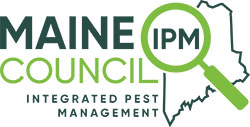DACF Home → Bureaus & Programs → Division of Animal and Plant Health → Integrated Pest Management → IPM Council
Integrated Pest Management (IPM) Council

Public Meeting Schedule
What is IPM?
Integrated Pest Management, or IPM, is an environmentally sound approach to managing pests such as insects, weeds, plant pathogens, and wildlife on farms and forests, in our communities and in our homes. IPM relies on proper pest identification, monitoring, and combinations of pest avoidance and management strategies to protect people, crops, and the environment while minimizing pesticide use. Get Started with IPM (PDF). IPM Compared to Organic Pest Management (PDF). Statement on Municipal Ordinances (PDF)
- On this page:
Who We Are
The Maine Legislature established the Integrated Pest Management Council to promote, expand and enhance integrated pest management adoption in all sectors of pesticide use and pest management within the State. Our mini-poster describes what we do.
The Maine IPM Council is administered and coordinated jointly by the Maine Department of Agriculture, Conservation and Forestry and the University of Maine Cooperative Extension. The Council is made up of 11 members representing a broad base of IPM stakeholders.
Our Mission
The Integrated Pest Management Council will define, promote and enhance implementation of IPM practices that reduce or minimize harmful environmental and human health impacts of pesticides and other pest management practices. The Council will promote the education of the public regarding the need, benefit, and practices of IPM.
Specifically, the council is directed to:
- Identify long-term and short-term priorities for integrated pest management research, education, demonstration and implementation; Priority Needs for IPM (updated 2017)
- Serve as a communication link for the development of coordinated multidisciplinary partnerships among researchers, educators, regulators, policymakers and integrated pest management users;
- Identify funding sources and cooperate on obtaining new funding for on-site trials, education and training programs and other efforts to meet identified goals for expanding, advancing and implementing integrated pest management;
- Establish measurable goals for expansion of integrated pest management into new sectors and advancing the level of integrated pest management adoption in sectors where integrated pest management is already practiced; and
- Cooperate with appropriate organizations to establish protocols for measuring and documenting integrated pest management adoption in the State.
Activities
The Maine IPM Council meets twice annually to identify needs and outline action steps. The priorities and action steps taken to date are:
- Develop or identify IPM standards for Maine
- Action: The Council has partnered with the New England IPM Information Network and its parent organization, the Northeast IPM Center to share information used in the development of 'strategic plans' and 'resource profiles' that include IPM practices and standards. Development of these products is on-going and are designed to provide a road map for advancing IPM in all sectors of pesticide use.
- Develop or advance consumer education about IPM
- Action: The Council developed a table display and a brochure aimed at public education about IPM which is available for use at garden shows, shopping malls, educational events and other public venues.
- Foster partnerships among practitioners, support organizations, institutions, agencies, and customers
- Action: Council members work to raise awareness among their constituents and promote active partnership with other organizations through formal and informal presentations at meetings, conferences and other venues to promote greater adoption of IPM in Maine.
- Action: Participate in Environmental Stewardship Program. Update Partnership Strategic Plan annually.
Get Help with Pests
In Maine, you can contact your county Cooperative Extension office or the Extension Pest Management Office for pest identification and management recommendations. They can also direct you to other reliable resources. Outside of Maine, check the phone book for the Cooperative Extension office nearest you.
Or, check Got Pests? for good pest identification and management tips.
Or, watch these selected videos on IPM solutions for common pests:
- What's in that Pesticide (UC IPM)
- Home Gardens (Univ of MD)
- Lawn Care (US EPA)
- Japanese Beetle (Univ of Maine)
- Ants (UC IPM)
- Bed Bugs
- Head Lice (CO Coaltion for Healthy Schools)
- More home/garden videos (UC IPM)
- Mosquitoes (Univ of Maine)
- Mosquitoes (UC IPM)
- Protect yourself from Ticks (Univ of NH)
- Treating your Yard for Ticks (Univ of RI)
- IPM (NRCS)
- Apple IPM (New England Apple Growers Assn) Part 1 Part 2 Part 3
- Late Blight Scouting & ID (eXtension)
- Sweet Corn Scouting (NYSIPM)
Contacts
Hillary Peterson, Co-coordinator
Maine Department of Agriculture, Conservation and Forestry
28 State House Station
Augusta, ME 04333
207-215-4793
Jim Dill, Co-coordinator
University of Maine Cooperative Extension
491 College Avenue
Orono, ME 04469
1-800-287-0279